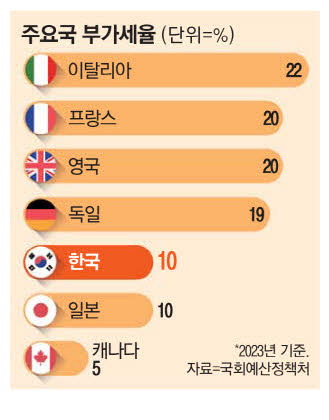 사진 확대
사진 확대 It has been confirmed that the International Monetary Fund (IMF) has recommended a hike in value-added tax to South Korea to secure tax revenues amid growing concerns over shrinking tax revenues and mismatching as candidates compete for fiscal expansion ahead of the presidential election. The VAT has been fixed at a single 10% tax rate for nearly 50 years since its introduction in 1977.
According to the Korea Institute for Taxation and Finance on the 1st, the IMF included such revenue expansion plans in a report published earlier this year after annual consultations with the Korean government and the Bank of Korea at the end of last year. The methods proposed by the IMF include raising the VAT rate and adjusting the reduction. In addition, the IMF recommended that the trend of increasing personal income tax credits also needs to be overhauled.
The reason why the IMF suggested the need to raise VAT is that the VAT income is insufficient due to the low VAT rate compared to developed countries. “Korea’s VAT rate is 10%, lower than the average of 18.5% in developed countries,” the IMF said. “While other developed countries’ VAT reductions have decreased, Korea is on the rise.”
Earlier last year, the Organization for Economic Cooperation and Development (OECD) also proposed an increase in VAT.
In fact, the tax rate has never changed since the introduction of VAT. Increasing the VAT can raise overall prices, and in this case, it is a greater burden on the low-income class than the high-income class, so the tax rate is not touched regardless of the regime.
According to the National Assembly Budget Office, Korea’s VAT rate is lower than that of advanced countries. As of 2023, the UK and France are at 20%. Italy has the highest VAT rate among major countries at 22%. Germany also has 19 percent. The OECD average VAT rate is 19.2%. Of the 37 OECD countries, only two countries have lower VAT rates than Korea, Canada (5%) and Switzerland (7.7%).
[Reporter Moon Jiwoong]